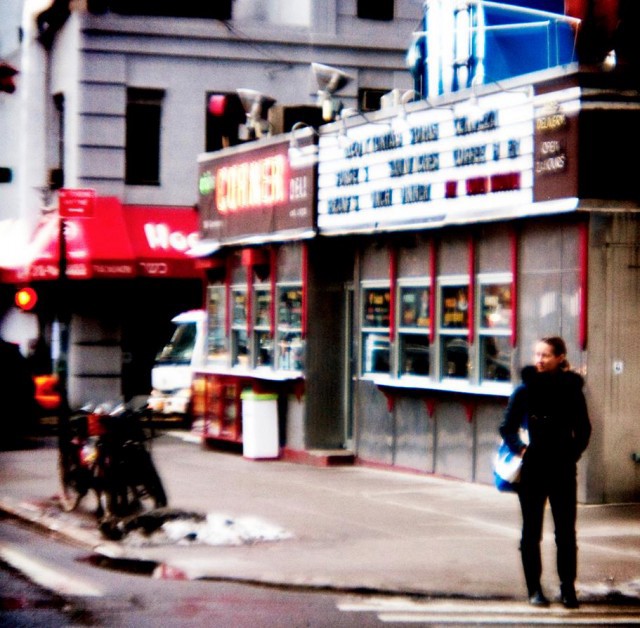The Unglamorous Life of a New York City Private Eye
by Emma Winsor Wood

“Sorry,” a voice said.
I turned to face the petite brunette who had just tapped my shoulder.
“Sorry to bother you — but could I charge my phone here?”
“Of course!” Wine splashed onto my hand as I gestured to the nearest outlet. “Under that table,” I said.
“Thanks so much,” she said. “I’m on a job in the Bronx tonight. I would’ve been lost without my phone.”
I had been waiting to meet a friend of a friend, a girl named Alexis. I realized then that she had snuck up on me, and that I should have expected this, as Alexis spent a year working as a private eye.
*
Alexis Tabak does not fit with the expected (and outdated) profile of someone in her former profession: she’s a 25-year-old Vanderbilt grad with sharp features, a soft smile, and a passion for Soul Cycle. The day we met, she had just come from a class and was dressed accordingly in black spandex and a sweater. Although Tabak now works as an investigator for the city of New York, she freelanced for established PIs for over a year.
What drew her to the field? “I wanted to see how extraordinary I could make life for myself,” she said.
After cold-calling over 40 agencies, Tabak landed some meetings, including one with Michael McKeever, an investigator who specializes in domestic surveillance. Suspicious spouses and lovers comprise the majority of his business. From an outsider’s perspective, domestic surveillance could appear to overlap with therapy: clients reveal their disturbing secrets and expect the PI to help find a solution. But, as Tabak reminded me, the PI isn’t hired to soothe and support. He’s hired to deliver facts, like a journalist.
*
“You’re a private investigator!” I exclaimed. She smiled and nodded. Although I could guess that Tabak didn’t spend her days drinking martinis in Lamborghinis, I felt that the secretive, somewhat antiquated nature of her profession cloaked her in glamour and romance. I wanted to know everything.
“Did you say you’re on a job later?”
“Yup. I have to sit on some guy’s balcony in Riverdale.”
It was November. I wondered if she would be cold. Also — what would sitting on a balcony do? (She was waiting to confirm that the client’s neighbor was smoking pot.) And wasn’t it dangerous? (Maybe. She would be alone, in a strange man’s apartment. But her boss was sure the guy was harmless.)
“I have to go,” she said, after we’d talked for a while. “I didn’t know I’d be working tonight until a few hours ago.”
*
After she applied for a job with him, McKeever told Tabak to meet him at a Starbucks. It was January 2012. Tabak arrived, steeled for an interview. But McKeever wasn’t waiting inside the coffee shop. Instead, he was parked out front in a nondescript SUV. He waved Tabak into the car.
Lean and tall with silver hair and the faintly lined face of a man who had paid many years of taxes, McKeever looked vaguely familiar and entirely unremarkable — like a dad you might have bumped into a friend’s kitchen. He started speaking before Tabak had even settled herself into the passenger seat: “Watch that car,” he said and handed her photo of the subject. “She’s inside now, so keep an eye out.” It wasn’t an interview. They were on a job.
Was it extraordinary? Not exactly. An hour later, Tabak and McKeever were still waiting for the girl to emerge. She called her father to cancel their lunch plans.
*
In the weeks following that first meeting, Tabak began working with McKeever on a regular basis. They would meet on site around 5:00 pm in one of McKeever’s black or navy cars, and wait. If they were tracking the subject in a crowded place like a theater or a train station, Tabak — dressed, as you would expect, in all black with a hat and sunglasses; an easy disguise in New York — would loiter on the sidewalk. She and McKeever communicated via walkie-talkies, until (“Subject spotted”) the chase began.
Tabak followed on foot; McKeever by car. Every few minutes, McKeever and Tabak would take a few seconds of time-stamped footage on their small video cameras.
In about 50 percent of cases they turned up nothing out of the ordinary. Most of their time was spent waiting for deviations from habit that never occurred. Tabak told me that the majority of people are very boring: they go to work, Duane Reade, the gym, and then they go home.
Over a year ago, Tabak left private investigation for a more stable life working for New York City’s Department of Investigation.
“I wanted to do something to set myself apart,” she said, “but now I realize why people go to the office.”
Emma Winsor Wood is a poet and freelance writer. She tweets @emmawinsorwood.
Photo via Roey Ahram/Flickr